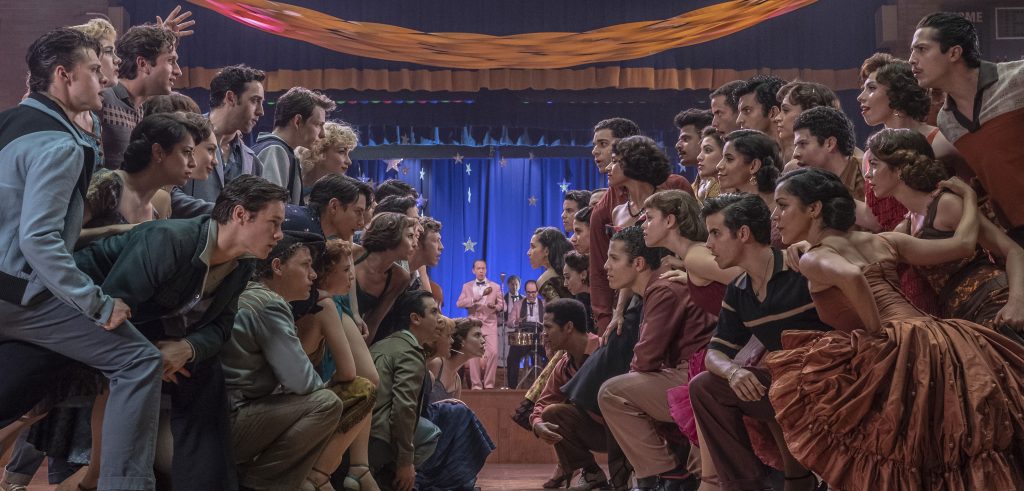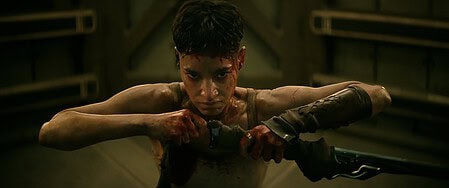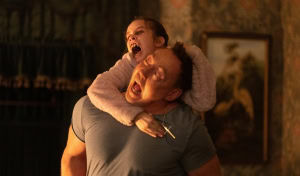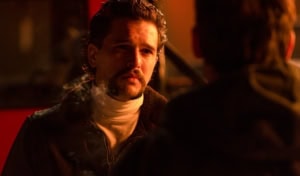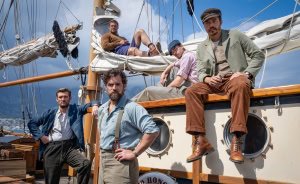Grab your castanets! It’s home sweet home, Amer-ica ♪♫. With only a week until the theatrical release of the highly anticipated remake of West Side Story, I had the pleasure of attending a virtual press conference for the film.
Moderated by Sunny Hostin, one of the co-hosts of ABC’s The View, the star-studded panel included director Steven Spielberg, screenwriter Tony Kushner, as well as the following cast members: Rachel Zegler (Maria), Ansel Elgort (Tony), Ariana DeBose (Anita), David Alvarez (Bernardo), Mike Faist (Riff), Corey Stoll (Lieutenant Schrank), Brian d’Arcy James (Officer Krupke), Josh Andres Rivera (Chino), and executive producer Rita Moreno (Valentina), whose portrayal of Anita in the 1961 version of the film earned her an Academy Award.
The adaptation and reimagining of the beloved musical have fans waiting with bated breath to see the Sharks and the Jets hit the silver screen on December 10th. Speaking with Vanity Fair last year, Spielberg shared, “Our entire home was festooned with classical musical albums, and I grew up surrounded by classical music. West Side Story was actually the first piece of popular music our family ever allowed into the home. I absconded with it—this was the cast album from the 1957 Broadway musical—and just fell completely in love with it as a kid. West Side Story has been that one haunting temptation that I have finally given in to.”
The filmmaker’s love for the musical was palpable during the press conference, speaking to the thought and intention that went into creating the script – including the conscious decision to abandon subtitles during Spanish-speaking scenes. The use of brilliantly nuanced storytelling speaks volumes to the care the team put into addressing character complexities and themes of racial prejudice.
Steven and Tony were asked if they ever considered setting the film in the present day, and why they ultimately decided to keep it in the ‘50s.
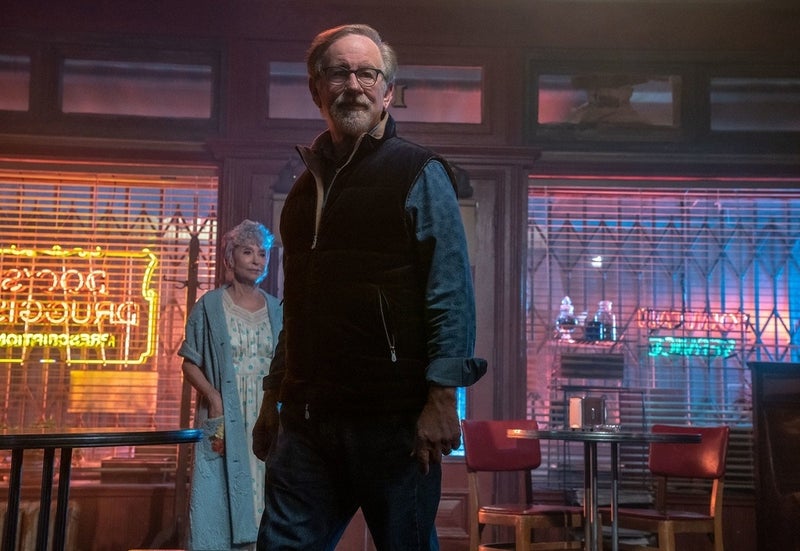
TONY: We certainly never discussed transposing it. There’s nothing dated about the score at all. Every time you hear that music you’re gonna feel like it’s just happening now. So there’s nothing quaint or old-fashioned about it. And Sondheim who was, you know, the greatest lyricist, and one of the greatest composers ever to work, is a master at a kind of specificity that is certainly timeless in the sense that his insights into the way people think and feel are never gonna get dated. It would have felt, I think, odd for those songs to be juxtaposed into 2021.
The influential and revered Stephen Sondheim sadly passed away last week at the age of 91. West Side Story was the composer-lyricist’s first major project, and the cast took a moment to share how iconic and meaningful it was to be singing his words for the film.
Speaking to how it felt playing the role of Anita, Ariana DeBose shares:
I inherently did not think that this was ever a job that I would book. Because Anita’s don’t look like us. You know, they look like Rita Moreno. I was…really amazed that Steven and Tony were open to having the conversation around it ‘cause it was something I said in the room. I was like if we don’t want to touch on that, you know, by virtue of my being a black woman that can inform this character’s path, then maybe I’m not the choice for you.
Mike Faist was asked about the racist nature of Riff’s character, and what it was like having to portray him.
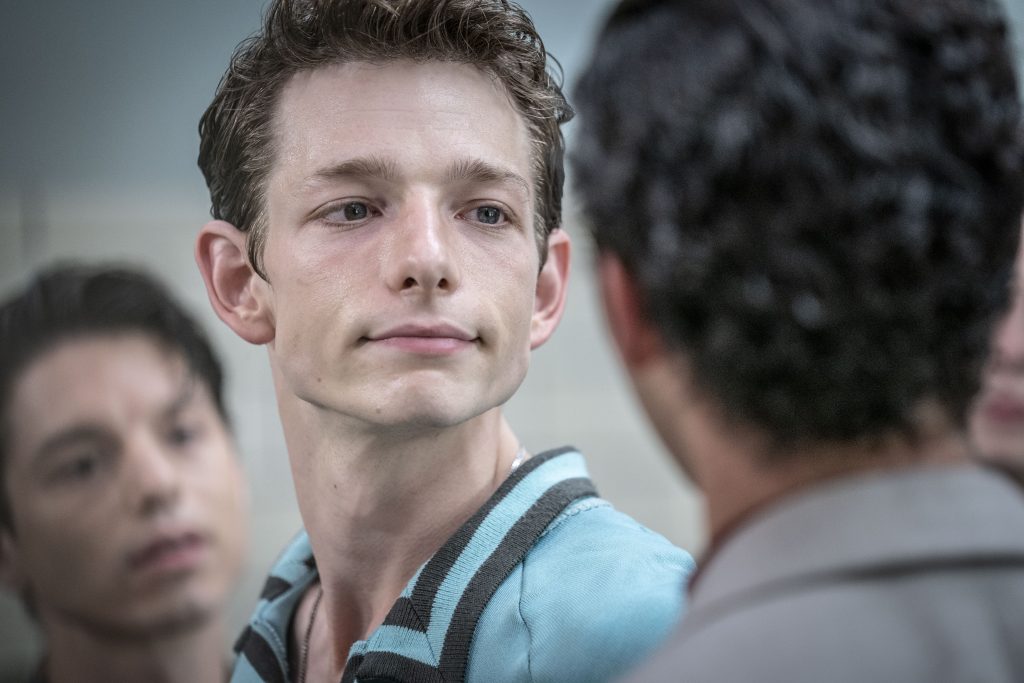
MIKE: You have to really lean into where it’s coming from. Obviously, like fear…but where is that fear coming from? And underneath all of that, there is a love. These boys…all they have is this toxicity of a tribe and familial relationship that they’ve built and culminated together and it’s totally unhealthy and co-dependent, but it’s what they got. And it’s the only thing they got. And, the inability to recognize that the entirety of the city is changing before everyone’s eyes and the reluctance…to accept change…it’s fear.
The film is so steeped in the concept of representation. Josh Andres Rivera talks about the connection to his Puerto Rican heritage and being a part of a story with very complex, nuanced characters.
JOSH: You get to really see and understand and kind of empathize with the arcs of all the characters and how everything plays out. You see it in real time. So, to be able to represent that, to be able to like chat with my family about it…it’s nothing short of incredible.
Next, Corey Stoll dived into his character’s persistent admonishments for people to “speak English because we’re in America” –– and what it was like tackling such a crucial discussion that’s still being had today.
COREY: I think the understanding of race and of ethnicity and of language that he [Lieutenant Schrank] brings to it, is more about the systemic forces and then how power instills itself on a community as opposed to that person is a racist so we can pick them out. It’s about power. And about how those who are in power hold onto it. I represent the authority trying to hold that line. And, you know, taking away somebody’s language is the first thing you do when you’re trying to instill that power.
With much of the film shot in Manhattan and Brooklyn, what was Rachel Zegler’s favorite part of filming in New York City?
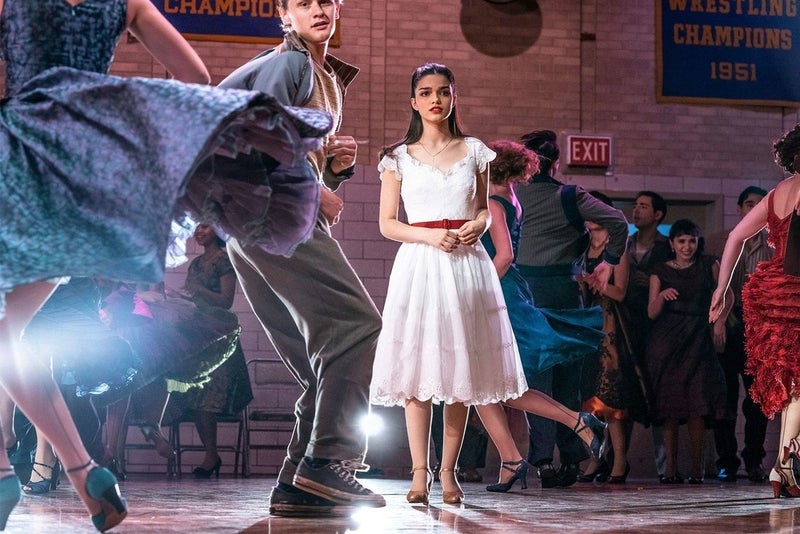
RACHEL: New York became a character. Even if you’re not familiar with 1957 New York, if you’re familiar with New York now, it embraces that so well. And I think the film really became a love letter to New York, not only because of how stunning it was visually, but because of the context that Tony Kushner gave it in the script of understanding the political climate as well.
Ariana went on to discuss the film’s dancing scenes as an ensemble in comparison to her time as a soloist in “Hamilton.”
ARIANA: You know, that’s something that I actually love about our film, the Jets and the Sharks, even individually as dancers, you’re watching a bunch of soloists move as a unit. Because they all have their own funk and their own, like, something that they’re putting on it that’s very character-driven. So, again, it’s a really beautiful thing to watch what makes everybody unique come together to create a community.
What was the most challenging thing about playing the role of Maria for Rachel? And was she nervous about the fact that Natalie Wood played her in the original film?
RACHEL: Oh, goodness. I mean, I think any film is a challenge. If it’s easy, you don’t care. And I care a lot about this story. This story informed me as a kid of what I wanted to do for the rest of my life. I think that the original film stands on its own as this iconic piece of film history that everybody is going to refer to for the rest of time. And, that was very present in my mind. But, you know, I didn’t revisit that material because I didn’t want to compare in my own mind. It wasn’t like, “Am I going to overshadow a legacy of a late, great actress?” That was never the intention, it was just, what can I bring from my own life experience that wasn’t there before? The first Latina to play Maria onscreen. That’s a huge thing. It’s a part of a legacy of a very important musical to so many people, that’s not lost on me. And I can only hope that wherever in the universe Natalie Wood is, she’s proud of what I did.
The cast shared their thoughts on the story being told with Latino actors.
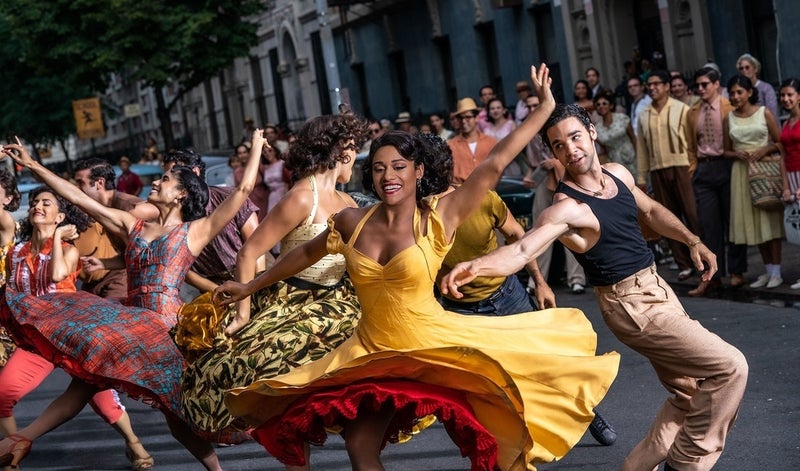
ARIANA: I mean, about time, and yay. Well, and look at how different we all are. Validating all of these lived experiences, and showing that celebrating the diaspora, I think our film does a really good job of that, and I’m really proud.
RACHEL: It was one of those really interesting conversations we had with Tony Kushner about our own lived experiences, whether or not we spoke the language at home, how ingrained we were in our own culture. It was a huge part of the process. And we had, you know, not only historical conversations, but conversations about our own modern life that if you didn’t have an authentic Latino cast, you wouldn’t be able to capture that on screen.
DAVID: I mean, I think it’s a huge step forward…and I think this is just opening so many doors for future actors from the Latino community. The process was handled with a lot of sensitivity. It was very informed, there was a lot of research done. I think everybody learned.
From the challenges of dancing in the sweltering NYC weather to the months of practice nailing down the stunning choreography (I’m looking at you, Ansel), the cast was brimming with energy through the entire press conference. They all spoke to the joy and spirit of the film and what a rare and special opportunity it was to be a part of it.
West Side Story opens exclusively in theaters on December 10th.

Either typing away on my keyboard or nose-deep in a good book. Say hi to me on Twitter @Kkantro.


